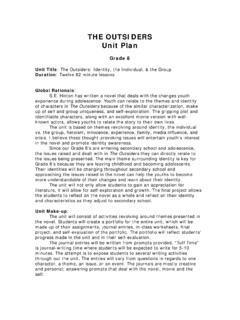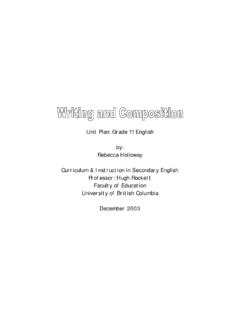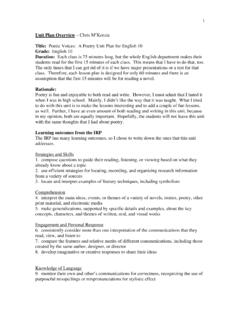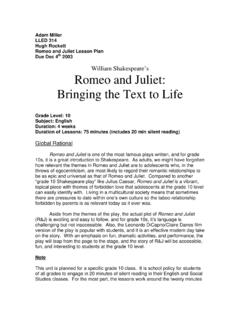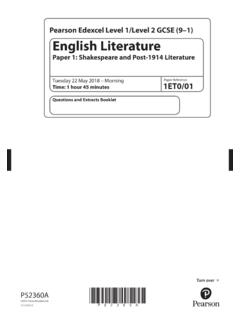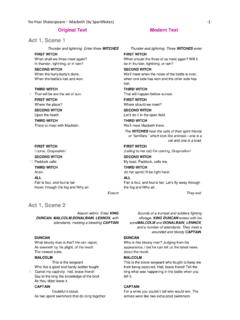Transcription of Unit Plan: Shakespeare’s Macbeth - Education Library
1 unit plan : shakespeare 's Macbeth English 11. Prepared by: Simon Mah (Student No. 74146994). LLED 314. December 4, 2003. B. Davison Introduction and Rationale This unit for English 11 students will be a study of William shakespeare 's tragedy, Macbeth . This timeframe of this unit will be based on the bell schedule at Burnett Secondary School. This unit will take four weeks and will consist of eighteen lessons (March 22 to April 16, 2004). The purpose of this unit is for the students to gain an appreciation of the history of the English language and English literature. William shakespeare has been considered as one of the greatest writers and pioneers of English literature. Through the study of Macbeth , it is hopeful that students will continue to value shakespeare 's contribution to literature.
2 Students will see consistency in how the study of the play will be conducted. Reading of the play will be done in class, followed by expressive writing, then a class discussion. This method is intended to help all students complete the play at the same time, allow students to ask questions about the play and to work with each other. Assignments will ask for academic writing and creative writing and artwork. Overall, this unit is intended for the students to have fun. Prescribed Learning Outcomes (Ministry of Education English Language Arts 11 ). Throughout this unit , students will be able to: Consciously use and evaluate a wide variety of strategies before, during, and after reading, viewing, and listening to increase their comprehension and recall Use efficient note-making and note-taking strategies Explain the effects of a variety of literary devices and techniques Demonstrate an understanding of the main ideas, events, or themes of the play Macbeth Develop coherent and plausible interpretations of material Support their opinions or respond to questions and tasks analyse communications to identify weak argumentation compare and analyse different presentations of the same ideas and issues adjust their form, style, tone.
3 And language to suit specific audiences and purposes clarify and focus their topics to suit their purposes and audiences locate, access, and select appropriate information from resources apply various strategies to generate and shape ideas assess their own and others' work for sentence clarity, precision of language use, and variety and artistry of expression demonstrate a willingness to accept and provide constructive criticism and feedback demonstrate pride and satisfaction in using language to create and express ideas and personal viewpoints create a variety of academic, technical, and personal communications demonstrate confidence in their abilities to communicate effectively demonstrate a commitment to increase their proficiency in all aspects of communication interact purposefully, confidentially, and ethically communicate to clarify their ideas, understanding, and opinions demonstrate an openness to the divergent ideas and opinions expressed by classmates and others Overview of Assignments/Evaluation Techniques 1) Journal: this is intended to be a study guide.
4 Students will be asked to comment on ideas, quotes in pre-reading activities. During the reading of the play students will be given time to write questions and feelings about the play/plot and characters. Students will also make predictions in their journals. Students will also keep track of characters and make notes about them as the play progresses. (See handout in appendix). 2) Symbol and Paragraph: after the reading of act one, students will examine to key quotes and then use the quotes to form an opinion about Macbeth and lady Macbeth . Students will be asked to draw a symbol to represent each character and then write a paragraph that explains their argument. 3) Newspaper Article: students will write an article, reporting the death of Duncan.
5 (See handout in appendix). 4) Diary Entry: after the reading of act three, student will be asked to write 3 diary entries as Macbeth , one after scenes 1, 2, and 4. (See handout in appendix). 5) Coach's Corner: students will work in pairs to produce an in-class Coach's Corner . segment that comments/critiques the battle at the end of Macbeth . (See handout in appendix). 6) Essay: students will write an essay on a topic. Topics to be announced at a later date. 7) Movie Review: after watching a performance of Macbeth on video, students will be asked to write a review. 8) Tests/Quizzes: students will write tests after Act 1, Acts 2/3, and Acts 4/5. These tests will consist of basic comprehension questions, analysis of quotes, and paragraph responses.
6 9) Discussion: this will occur after each reading session. Resources The main text used will be The Global shakespeare Series The Tragedy of Macbeth with Related Readings. This is edited by Dom Saliani, Chris Ferguson, and Dr. Tim Scott. This text is a decent text which includes visuals and notes in the margins. Act the end of each act, there are review questions and at the end of the play there are a series of readings that can be used. Fifty Nifty Ideas for Teaching shakespeare prepared and presented by Sheri Field at the 2002. BCTELA Fall Conference. Allingham's definition of soliloquy from the BCTELA Literary Package: King Lear (1997). Carol Mayne-Ogilvie writes a teacher's resource book published by Oxford University Press. The book is from the Oxford School shakespeare series and is the Macbeth Teacher's Resource.
7 It provides summaries of each scene, key quotes from scenes, and written and group activities for each act. A video production of the play to be selected by the teacher based on availability at the school. Lesson No. 1. Title: Introduction to Macbeth Note: This is my first class with the English 11 students. This class will serve as an introduction to each other and to the play. Resources Macbeth , (Global shakespeare Series). Journal Assignment Handout Objectives In this lesson, the students and teacher will introduce each other. Student will be able to: Gain general background knowledge about William shakespeare and the play Macbeth Begin a journal that will serve as a study guide Introduction (25 minutes). Introduce myself to the class (1 minute).
8 Take attendance and create seating plan (4 minutes). Independent Writing: The teacher will have the name William shakespeare on the board. Students are asked to write what they know about the playwright and other comments about studying shakespeare . This will be added to their journal. (10 minutes). While students write, the teacher will distribute copies of Macbeth to the class. Discuss student responses (10 minutes). Body of Lesson (50 minutes). Mini-Lecture: Who Is shakespeare ? (15 minutes). Intro to Macbeth : characters, setting, themes (15 minutes). Introduction to the Journal: purpose, format, content (10 minutes). Journal Writing: Greed is the root of all evil students are to comment in their journal this phrase. What does this phrase tell us about human nature?
9 Is it good to be ambitious? What do you think this has to do with Macbeth ? (10 minutes). Assessment Nothing this period, except that information about shakespeare will be tested at a later date;. journal entries will be graded on an on going basis. Conclusion and Extension (5 minutes). Review what was covered in class: biography of shakespeare and journal assignment. Inform students to keep all journal entries/writings in a duo tang and bring them to every class, along with the text. Lesson No. 2. Title: Macbeth ( to ). Resources Macbeth , (Global shakespeare Series). Objectives Students will be able to: Comprehend the plot of the first three scenes of act one of Macbeth Express their personal feelings and questions of the first three scenes Discuss key quotes analytically Introduction (10 minutes).
10 Take attendance Students will write in their journals generalizations about witches and their powers. Volunteers will discuss their responses. Body of Lesson (65 minutes). Assign roles from scenes 1 to 3 to be read out aloud; oral reading of Macbeth , act 1, scenes 1 to 3. (25 minutes). After the reading, students will write in their journals: questions, reactions, notes on the main characters. (10 minutes). The class will discuss the three scenes: questions will be based on general comprehension, selected quotes from the text, and student raised questions. (30 minutes). Assessment To check if students comprehend the plot of the play read so far, the teacher will ask basic questions at the beginning of the discussion. Before the quiz on Act I, the teacher will collect student journals and read them.

